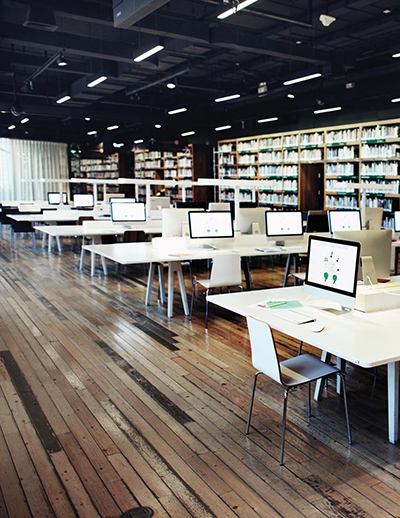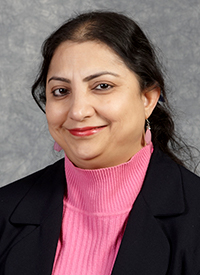Adelphi Associate Professor Aditi Bandyopadhyay, Ph.D., studies the compilation of these materials, which have undergone a remarkable transformation over the past several decades.
 The fate of reference services in today’s academic libraries
The fate of reference services in today’s academic libraries
Our inherent desire for learning—and the capacity to retain and apply that information—is one of the key elements that differentiates humans from other species. In a sense, we are still hunters and gatherers, but instead of seeds, berries and animals, scholars are often on the lookout for in-depth studies, statistical analyses and other forms of content to support a particular research project.
Adelphi Associate Professor Aditi Bandyopadhyay, Ph.D., studies the compilation of these materials, which have undergone a remarkable transformation over the past several decades. Her new article poses a compelling question: Is the need for mediated reference service in academic libraries fading away in the digital environment?
With four degrees to her credit, Dr. Bandyopadhyay is very much at home in academic libraries. A chance meeting during her Ph.D. studies, when she overheard a librarian mention a master’s degree in library science, set the wheels in motion. “A library has science in it?” questioned Dr. Bandyopadhyay, who was fascinated by the idea and feeling frustrated by the repetitive nature of her Ph.D. experiments.
Days later, she saw an ad for the library science program at the University of Calcutta, and, without telling her family (or her Ph.D. academic adviser), took the entrance exam and was accepted. “It was not as glamorous as becoming a scientist, and it was taboo to go against the flow,” Dr. Bandyopadhyay said. “Nobody thought I could do it, but I completed both degrees.”

Dr. Bandyopadhyay has drawn upon her expertise to help researchers, faculty and scientists across a broad range of fields extract different volumes and indexes that might otherwise be missed. Throughout the years, she’s kept tabs on the shifting tides in academic settings, as well as how students and faculty were using available resources.
In collaboration with co-author Mary Kate Boyd-Byrnes, Dr. Bandyopadhyay conducted a “detailed literature review to document and analyze the current trends in reference services in academic libraries,” discovering that human interaction is still a vital part of the research process. “A library is a place of knowledge, but there needs to be some kind of science in place to organize, classify and retrieve information as quickly as possible,” said Dr. Bandyopadhyay. “Otherwise, it’s a chaotic situation, which we’re seeing in the digital age.”
“The other science is human behavior—how we understand and organize knowledge,” continued Dr. Bandyopadhyay. “What are the systems to retrieve information in different formats? This is what attracted me.” And it’s not just students. Professors, too, often turn to Dr. Bandyopadhyay for citation analysis of their work, recognizing that Google Scholar and other search engine tools often deliver conflicting results.
Referencing more than 100 articles, Dr. Bandyopadhyay and Boyd- Byrnes concluded that there is still a pressing need for human-to-human communication. The study emphasized one crucial point in particular: “Technology cannot process information and connect the concepts using knowledge and experience like a human brain. At present, no digital resources or technologies have the abilities to interpret and synthesize information from multiple sources the way an intelligent and knowledgeable human being can do.”
Information literacy programs and formal instruction have continued to evolve with technological advances. For both students and faculty alike, it’s becoming increasingly important to take full advantage of the reference services available in academic libraries. Dr. Bandyopadhyay suggests that there’s a fluidity into how this can be implemented, which may include personal interactions, video instruction, electronic guidelines and other means that extend beyond a typical reference desk inquiry.
Adelphi recognizes the power of library science—not only for students on campus, but also as a benchmark for giving future scientists and academics the tools to effectively utilize reference services. With this educational pillar in mind, Adelphi is one of an elite number of universities that hires librarians as faculty, making studies like Dr. Bandyopadhyay’s possible.
“I am very grateful to help make information literacy a fundamental goal for student learning, and Adelphi has encouraged us to do it,” said Dr. Bandyopadhyay. “Research is not easy—it takes a lot of time. But I’ve always been very curious to learn a science from the field of knowledge.”
Adelphi librarian Aditi Bandyopadhyay, Ph.D.’s research interests lie in plant physiology, especially in plant tissue and cell culture.She was a research fellow at Bose Institute in Kolkata, West Bangal, India, from 1985 to 1990 before emigrating to the United States and accepting research positions at Farmingdale State College (State University of New York) and Picower Institute Medical Research, Manhasset.
She joined the Adelphi faculty in 1994 and has been an associate professor since 2001.